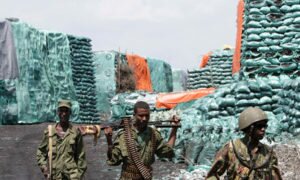
READ THE WHOLE REPORT Why Africa Matters to US National Security
The United States cannot afford to underinvest in Africa, a continent of over a billion people with growing political and economic power. And yet, there is a persistent misconception prevalent among the American public—and even many foreign policy professionals—that Africa is largely irrelevant to US national security.
This is dangerous, for three reasons.
First, transnational threats from Africa are persistent and real. The continent’s uneven democratic and economic growth and pockets of conflict contribute to a disproportionate number of weak and failed states, which threaten US interests at home and abroad by opening the door to terrorism, criminal activity, and pandemics. For example, the Islamic State of Iraq and al-Sham (ISIS) and other groups are expanding their reach across Africa and, but for a swift global response, the Ebola crisis of 2014 to 2016 could have caused well over a million deaths and vast economic harm.
Second, economic and political needs will inevitably draw the United States to Africa. Though the continent is currently underrepresented in the global economy, that will not last forever. Africa boasts a growing middle class and, by 2050, will constitute a quarter of the world’s population. While US businesses are underinvested in African markets, China and other global competitors are making deep economic inroads that are feeding jobs in their own countries and creating economic ties that translate into greater political influence. Though not always a zero-sum calculus, China’s deepening ties to the region will undoubtedly reduce US influence. Moreover, African states are forming an increasingly unified voice and salient voting bloc on global issues, particularly in multilateral fora; these developments could help either advance or block key aspects of the United States’ global agenda on issues ranging from counterterrorism to nuclear security.
Third, incidences of conflict, humanitarian crisis, and mass atrocities in Africa put significant pressure on the United States to act, in fulfillment of the nation’s historic global leadership role. Though some question the value of maintaining the United States’ role as “global policeman,” military and counterterrorism strategists staunchly agree that, in today’s complex and dangerous global environment, it is insufficient to merely keep Americans safe on American soil. Indeed, the rationale for promoting stability and development goes much further; it gets to how the United States has traditionally seen itself in the world, by promoting leadership and values that advance human dignity.
Serious engagement in Africa is needed, even if one’s view of US national security imperatives is limited to countering transnational threats. The logic is simple: instability breeds threats, and unilateralism breeds failure. More to the point, advancing the stability and partnerships needed to protect Americans ultimately requires promoting local economies, supporting good governance, and addressing conflict in African countries.
READ THE WHOLE REPORT [Why Africa Matters to US National Security]









 The Finance Minister of the Federal Government of Somalia has warned foreign firms operating in Halane, the African Union camp in Mogadishu...
The Finance Minister of the Federal Government of Somalia has warned foreign firms operating in Halane, the African Union camp in Mogadishu...

 Addis Ababa - The African Union's new chair Moussa Faki Mahamat on Wednesday questioned US commitment to fighting terrorism on the continent...
Addis Ababa - The African Union's new chair Moussa Faki Mahamat on Wednesday questioned US commitment to fighting terrorism on the continent...

 SAN DIEGO (AP) - Ali Said fled his war-torn Somalia two decades ago after his right leg was blown off by a...
SAN DIEGO (AP) - Ali Said fled his war-torn Somalia two decades ago after his right leg was blown off by a...


 Saudi Arabia, the United Arab Emirates, Bahrain and Egypt have vowed to take 'political, economic and legal measures' after Qatar's refusal to...
Saudi Arabia, the United Arab Emirates, Bahrain and Egypt have vowed to take 'political, economic and legal measures' after Qatar's refusal to...